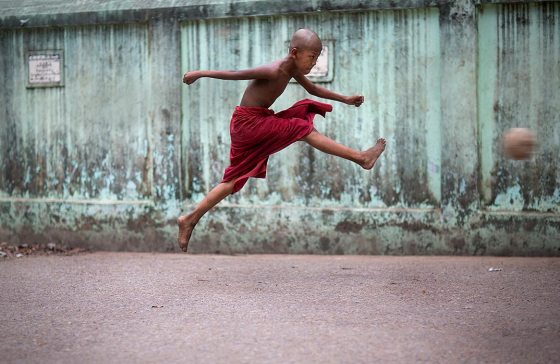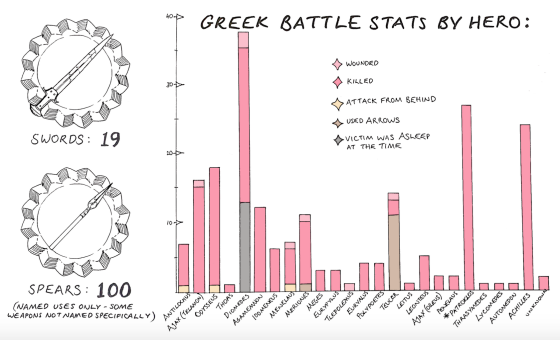Our editors dove into the archives to resurface top posts published on WordPress.com this year, from personal essays to comics, and photography to fiction. Here's a glimpse of what you published -- and what the community especially loved -- in 2014.
"Bill Watterson is the Bigfoot of cartooning," writes comic artist Stephan Pastis of the legendary Calvin and Hobbes creator. This summer, Pastis collaborated -- in secret -- with Watterson. Their awesome idea: Watterson would silently step in and draw Pastis' comic strip, Pearls Before Swine, for a few days, pretending to be a second grader. Pastis recounts the experience, offering a rare glimpse of Bigfoot.
I will apologize for ISIS when every single white American apologizes for the mass incarceration of black and brown people in the United States. I will post an 8,000 word apology when English people email me individual apologies for what the British Empire did to the subcontinent. I won't limit this to whiteness only; I will apologize when every single ethnic, religious group apologizes for whatever someone did simply because, under this debauched logic, they owe the world an apology for sharing an identity. When I start seeing these apologies, I will apologize too.
Until then, no apology.
In "No Apology," Brooklyn-based writer Mehreen Kasana pulls no punches in a bluntly powerful post explaining why she refuses to apologize for Muslim extremists. Her post forces all readers to take a hard look at identity, nationalism, and how we pick and choose who we hold responsible for violence -- and who we absolve.
Life goes on, even when there's chaos.
While much has happened in Ferguson, Missouri, since the August 2014 shooting of Michael Brown, this Don of All Trades post, published not long after the shooting, remains an intimate, resonant read. Don, a St. Louis police officer, recounts just another day on the job, in a town right outside of Ferguson, where life continues as usual and everyone -- cops included -- is invested in making the community better, safer, and more just.
So before you hold up your anti-Feminist placard proudly and smile at your own sense of empowerment, think not what Feminism can do for you, but what it can do for that one girl.
In a response to the #womenagainstfeminism movement, Hannah Collins says why she is a feminist and explains, especially to those who feel they don't need feminism, that many people around the world still need it.
During a visit to Myanmar, freelance travel photographer Tony Burns documented Buddhist monks playing football on the grounds of their monastery, after a day of classes. His photo essay, "Football, the religion," is a standout in our photography archives this year.
When I look around, I see the culture we've built turning from a liberating revolution into a repressive incumbency. We've built magical devices, but we don't care enough about protecting ordinary people from harm when they use them. . . . We don't care about the people who lose out when we disrupt the world, just the winners (who tend to look a lot like us).
Pete Warden, the CTO of Jetpac, says that nerd culture, once outside the cultural mainstream, now runs the world. And in this post from October, he explains why it must die.
This emotional attachment and personification of machines seems disingenuine to some people; spacecraft aren't people, they are collections of wires and circuits and nuts and bolts -- they don't have souls to become attached to. I dunno. I think they do have souls. They are the embodiment of every one who ever imagined them, worked on them, or stared at the data and pictures they returned. These little robots, in a way, are us. They are our dreams.
On the collaborative blog Write Science, astrophysicist Shane L. Larson pens a thought-provoking piece on the spacecrafts we've sent into the outer solar system, including the Voyagers and Pioneers, that will eventually die. Larson celebrates our human achievements in space, explores our relationships to the machines we build, and reminds us of the beauty and mystery of the cosmos.
You cannot answer prayers with miracles involving direct deliverance of suffering. However, you can bring joy. Lottery wins are usually the most simple. The miracolati will later dream of you, which will all go to the glory of our kind. They don't have to be big wins, we actually encourage little ones, as it keeps them hoping.
In this earthly guide to sainthood, Giovanni De Feo, a speculative fiction writer living in Genova, Italy, offers a glimpse into the rules of an afterlife and the responsibilities of a saint. Published at Cease, Cows, a journal of short fiction and prose poetry, De Feo's piece encapsulates the writing you'll find here: strange and exploratory.
This is what privilege is about. Like drivers, nice, non-aggressive white people can move in the world without thinking about the 'potholes' or the 'gravel' that people of color have to navigate, or how things that they do -- not intending to hurt or endanger anyone -- might actually be making life more difficult or more dangerous for a person of color.
In his popular summer post, Michigan-based pastor Jeremy Dowsett explains how riding his bike has helped him to understand privilege. At once personal and accessible, the piece resonated with a wide audience (and was later republished on Quartz).
This isn't my home,
I am a temporary resident
and my family ties are
blessedly recent
but things are soaked
in history here,
you can't take a step
without stepping in it
In 1963, Medgar Evars, a black civil rights activist, was assassinated in the driveway of his home at 2332 Guynes Street in Jackson, Mississippi. Catherine's poem, set at the Evars family home, is a subtle but powerful tribute to Evars and his important work with NAACP -- and an indictment of a society that is still struggling to realize the dreams and promises of the civil rights movement.
At Greek Myth Comix, artist and classic civilization teacher Laura Jenkinson brings the classics to life through comics and infographics. In "Deaths in the Illiad," she presents an impressive illustrated infographic of Trojan and Greek deaths, battle stats by hero, notable battle performances, and more.
But in shadowing, throughout the day, you start to feel sorry for the students who are told over and over again to pay attention because you understand part of what they are reacting to is sitting and listening all day. It's really hard to do, and not something we ask adults to do day in and out. Think back to a multi-day conference or long PD day you had and remember that feeling by the end of the day -- that need to just disconnect, break free, go for a run, chat with a friend, or surf the web and catch up on emails. That is how students often feel in our classes, not because we are boring per se but because they have been sitting and listening most of the day already. They have had enough.
This fall, education writer Grant Wiggins shared an account from a veteran high school teacher who shadowed tenth and twelfth grade students for two days. The experience was eye-opening, while the post generated an overwhelming response via comments and emails.
Those who choose to remain placeless find that next to us lays either an empty pillow or a body that we feel little affection for, merely a vessel for countenancing this intentional loneliness. Eroticism is not an antidote; it is a Band-Aid.
Cody C. Delistraty, a writer and researcher based in Paris and Oxford, writes about culture, psychology, and the human condition. In "The Eroticism of Placelessness," he muses on placelessness -- inhabiting in-between spaces -- and its connections to freedom and romance, but also loneliness. We appreciate Delistraty's blend of essay, research, and commentary and eloquent discussions to bigger questions.
We're proud of the global community of bloggers that publish on this platform each day. You're welcome to browse recent editors' picks on discover.wordpress.com.
We look forward to reading you in 2015!




0 comments:
Posting Komentar